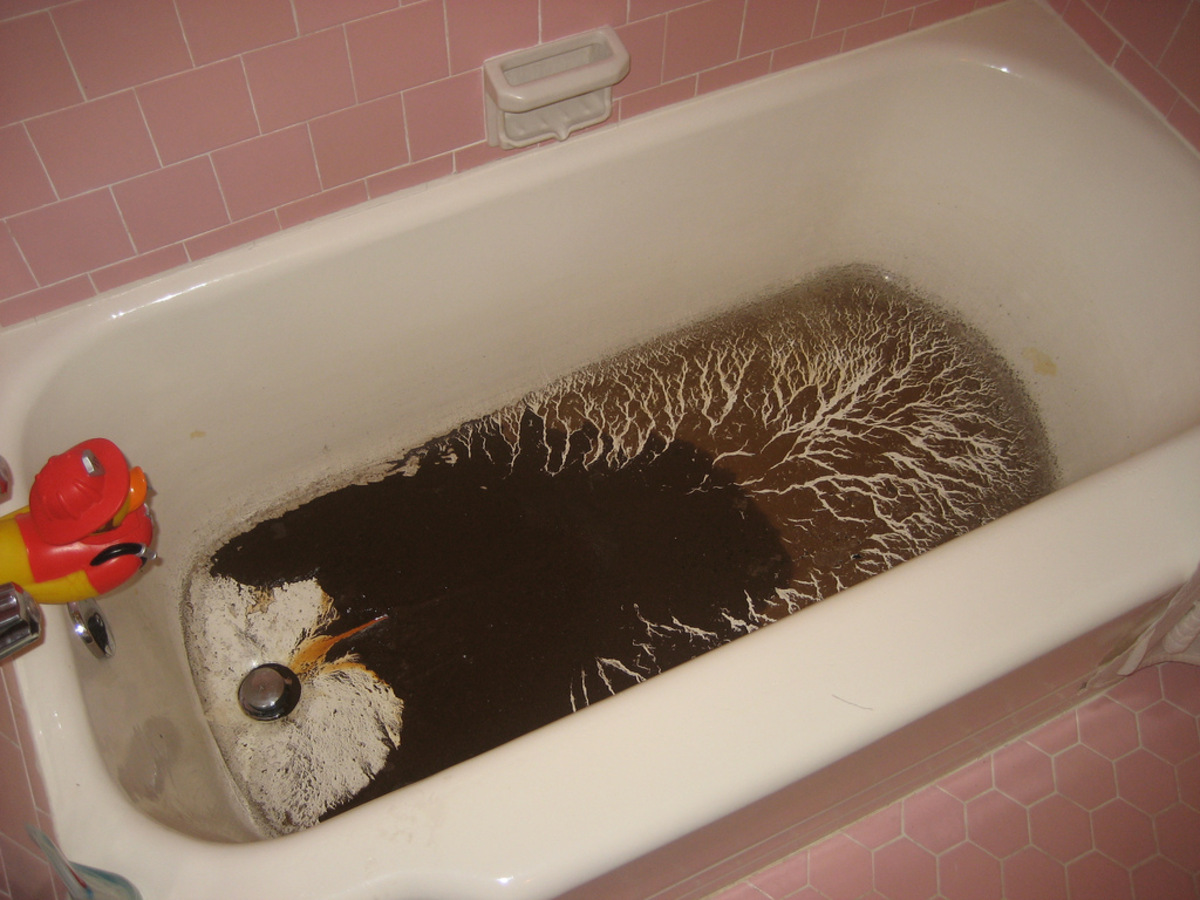Our Guide to Sewage Emergence in the Bathtub
Our Guide to Sewage Emergence in the Bathtub
Blog Article
The article which follows in relation to What To Do If Sewage Starts Backing Up Into the Shower is highly enjoyable. Don't overlook it.

Sewer backup in the bath tub can be a distressing and unsanitary issue for any type of house owner. Not just is it troublesome, however it likewise positions major health dangers and indicates underlying concerns with the plumbing system. Recognizing why sewage is coming up with the bathtub is critical for taking proper action to address the issue properly.
Introduction to the Concern
Understanding the Issue
When sewage draws back up right into the tub, it's a clear indicator of an issue with the water drainage system. The wastewater that should be moving away from your home is rather finding its way back right into your living space, which can lead to significant damages and health hazards.
Potential Reasons
A number of factors can add to sewer back-up in the bath tub. From clogs in the sewer line to problems with the plumbing infrastructure, identifying the origin is vital for discovering a service.
Usual Factors for Sewage Back-up
Obstructions in the Sewer Line
Among one of the most usual root causes of sewage backup is a clog in the sewer line. This can take place as a result of the build-up of debris, grease, or international items in the pipelines, preventing correct circulation and triggering sewage to back up right into your tub.
Tree Root Breach
Tree roots seeking dampness and nutrients can penetrate sewage system lines with little splits or joints. Over time, these origins can grow and broaden, creating considerable damage to the pipelines and bring about sewage back-up issues.
Aging Framework
Older homes may have dated plumbing systems that are more prone to deterioration, cracks, and wear and tear. As pipes age, they end up being extra prone to leaks and obstructions, enhancing the chance of sewer back-up cases.
Heavy Rainfall or Flooding
Throughout durations of heavy rainfall or flooding, the sewer system may become overwhelmed with excess water, causing back-ups and overflows. This can lead to sewage backing up right into tubs and other components inside the home.
Health And Wellness Risks Connected With Sewage Backup
Contamination of Supply Of Water
Sewer backup can contaminate the supply of water in your house, positioning a significant health threat to you and your household. Direct exposure to polluted water can cause gastrointestinal problems, skin infections, and various other ailments.
Spread of Illness
Sewage contains unsafe microorganisms, infections, and bloodsuckers that can create a variety of diseases, consisting of liver disease, cholera, and gastroenteritis. Entering into contact with sewer or contaminated surfaces places you in jeopardy of infection.
Mold and mildew Development
Dampness from sewage backup can create optimal problems for mold and mildew development in your home. Mold spores can worsen breathing issues and cause allergies in delicate individuals, making timely clean-up essential.
Indicators of Sewer Backup
Foul Odors
Unpleasant smells emanating from drains or components, particularly in the shower room, might show sewage back-up concerns. These smells are often strong and persistent, indicating an issue that calls for instant focus.
Slow Draining Fixtures
Bathtubs, sinks, and toilets that drain pipes gradually or otherwise at all could be experiencing sewage back-up. If numerous fixtures are affected all at once, it's likely that the problem stems from a typical point, such as the primary sewer line.
Gurgling Noises
Unusual gurgling or gurgling noises originating from drains pipes when water is running elsewhere in your home are a sign of air caught in the plumbing system. This air accumulation can arise from sewer back-up and need to be investigated promptly.
Immediate Actions to Take
Turning Off Water
In the event of sewer backup, it's important to turn off the water to prevent more contamination and damage. Find the main water shutoff valve in your home and shut it off until the issue can be solved.
Calling a Specialist Plumber
Handling sewage backup is not a DIY work. Get in touch with a certified plumber with experience in handling sewage-related concerns to evaluate the scenario and carry out essential repair services or cleanups.
Preventing Contact with Contaminated Water
Until the sewage back-up is fixed, prevent contact with infected water to avoid the spread of microorganisms and virus. Wear protective gear if you need to be in the damaged location and clean your hands extensively later.
Preventive Measures
Routine Maintenance of Drain Lines
Arrange routine assessments and maintenance of your sewage system lines to recognize and resolve possible problems before they escalate right into major troubles. This can consist of cleaning out particles, evaluating for tree origin breach, and fixing any damaged pipelines.
Setting Up Bayou Shutoffs
Think about installing bayou shutoffs in your plumbing system to avoid sewer from receding into your home throughout durations of heavy rainfall or flooding. These valves instantly close when water draws back up, protecting your residential property from contamination.
Proper Disposal of House Waste
Stay clear of flushing anything aside from bathroom tissue and human waste down the toilet to avoid blockages and clogs in the sewer line. Dispose of grease, oil, and other home chemicals appropriately to lessen the threat of plumbing troubles.
Tidying up After Sewage Backup
Disinfection Procedures
Thoroughly disinfect and sanitize affected locations after sewer back-up to remove unsafe microorganisms and protect against mold and mildew growth. Use appropriate cleansing items and safety gear to guarantee safe and reliable clean-up.
Remediation of Affected Areas
Repair any type of damages to flooring, wall surfaces, or fixtures brought on by sewer back-up. Depending on the degree of the damage, you might require to change carpeting, drywall, or various other materials to recover your home to its pre-loss condition.
Why is There Sewage Coming Up Through the Bathtub
Sewage in your bathtub is a major problem that can make you want to abandon the bathroom for good. You don’t have to. However, it is important to identify the source of the issue and take the necessary steps to resolve it in order to avoid any health risks and property damage. In this article, we will discuss what could be causing sewage to back up through your bathtub so you can take action quickly and effectively.
The Main Reason For Sewage Backup in The Bathtub
All the sinks and toilets in your home connect to different pipes that lead to the main sewer line. The sewer line then connects to the municipal sewer system. This connection works seamlessly on a daily basis, but there can sometimes be a problem with the main sewer line.
The most common cause of sewage backup is a clogged or blocked main sewer line. The main sewer line can be clogged due to the accumulation of debris, tree roots or grease buildup, or other materials. Another possible cause is a collapsed pipe. When this happens, your toilets and sinks won’t be able to drain properly. This is when sewage starts backing up through the bathtub. If the problem has been occurring for some time now, it might be time to consult with a plumber as there may be more severe damage that needs fixing.
How Can You Tell if it’s Coming From Your Sewer Line?
If you’re experiencing a sewage backup in your bathtub, then you can use a few simple methods to determine if it is coming from the main sewer line. First, try to unclog the tub drain with a plunger or an auger and see if that helps. If not, then inspect all of the drains in your house and check if there is any blockage in them. If some of the other drains are not working fine, then it’s likely the problem is with your main sewer line.
Common Signs of a Clogged Main Sewer Line
If you suspect that your main sewer line is blocked, then there are a few common signs to look out for. Frequent clogs in your home are a sure sign of a clogged sewer line. You can also check for slow drainage from all the plumbing fixtures.
Slow Drains
If you notice that it takes longer for your sinks and toilets to drain, then this could be a sign of a clogged main sewer line.
Frequent Clogs
Another common sign is that your drains or toilets become clogged almost all of the time. If this happens, then it could be a sign that the main sewer line is blocked.
Water Backup
Do you notice water or sewage coming back up from any of the drains in your home? If your answer is yes, you may have a clogged main sewer line.
Sinkholes
If you’ve noticed sinkholes in your yard or overflowing sewage from the ground, you may be facing a blocked sewer line issue.
Your Shower or Sink Makes Gurgling Noises
Have you noticed gurgling noises coming from your sink or shower lately? These are typically signs of a blocked sewer line and should be checked out immediately.
How to Prevent a Main Sewer Line Clog
Once you’ve identified that your main sewer line is clogged, it’s important to take steps to prevent it from happening again. The best way to do this is to avoid putting any solid material that can clog the drain, such as grease and other debris. You should also be mindful of what you flush down your toilet. In addition, you should schedule regular maintenance for your main sewer line. This will help keep it clear and free from clogs or backups.
What Should You do if You Notice Sewage Backing up Through The Bathtub?
If you’ve noticed sewage backing up through the bathtub, then it is important to call a professional plumber immediately. A plumber can inspect the situation and determine what the cause is, such as a blocked main sewer line. They will also be able to advise you on how best to fix the issue. In some cases, a simple drain cleaning may be all that is needed.
However, if the blockage is severe, then your plumber may need to use more advanced methods to clear the blockage.
No matter what, it is important to always call a professional plumber if you experience any kind of sewage backup. They will be able to assess the situation and provide you with a solution that is best for your home.
https://baylorinc.com/blog/why-is-there-sewage-coming-up-through-the-bathtub/

Hopefully you liked our post on . Thanks so much for spending some time to read our content. Enjoyed our write-up? Please quickly share it. Let others find it. We enjoy reading our article about Water Coming up Bathtub Drain.
Call Today
Report this page